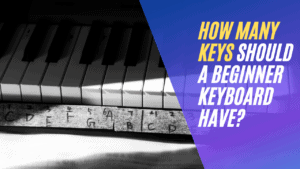How Long Does it Take to Learn the Piano?
This is a hard question to answer and there are a number of factors that can speed up or slow down the learning of any musical instrument. When it comes to adults learning to play the piano, they tend to learn at a slower rate than a child. Some people have a natural talent for playing, they may have access to professional instruction and have clearly defined goals. But, generally speaking, the more time and effort that you put into learning the faster you will learn how to play the piano.
Table of Contents
What is Your Exact Goal?
This may seem like a strange question to ask, after all, you want to learn how to play the piano. But, as the old adage goes, “failing to plan is planning to fail” and you need some kind of plan to succeed. Some people try to learn to play with a lesson every couple of weeks and no access to a piano or any other type of keyboard at home. Although you may learn how to play in this manner, it’s likely that the process will be very long and frustrating. When you start out with a clear goal, it’s easier to create a plan that gets you to where you want to be and this is true in any endeavor.
Let’s face it, if you’re learning to play as an adult, it’s probably for the pleasure of playing. Perhaps you want to share your piano playing with your children or you always wanted to learn but never seemed to find the time. The chances of playing at the concert level are slim to none for anyone learning to play the piano as an adult. It takes a natural talent and 8-12 hours of daily practice for at least 20 years to become a concert pianist.
This should not deter you from playing, but learning to play for pleasure alone is a vague goal for most people. It’s a good idea to have a specific goal in mind, such as learning to play a certain piece of music. Of course, learning to play Brahms would be a considerable undertaking that would be especially complex for a beginner. This would require several hours of practice every day and most people wouldn’t have the time to devote to this task. It’s a better idea to lower your sights a little and look at playing a piece of music that’s more achievable. It may seem odd, but many adults learning to play piano cite Chopin, Einaudi, or even Mozart as excellent options for beginners!
At the earliest points of your piano playing education, you may think that playing music composed by one of these famous composers would be impossible. But, there are many books on the market devoted to helping you play more accessible pieces with reasonable competency. Once you understand the basics you can refine your playing style and practice the piece to become proficient. Then you can add more complex pieces to your repertoire and your playing style will grow organically.
3 Piano Learning Scenarios Explained
Let’s take a look at three common learning scenarios and how they can affect the speed of your learning process, they are:
1. Casual Piano Lessons
In this scenario, the adult attends a piano lesson every fortnight and they don’t have access to a piano or other keyboard at home. The progress here will be extremely slow. Most piano tutors recommend a lesson at least once per week to develop good playing habits.
A casual learning approach can lead you astray very quickly between lessons and your progress is slowed when you have to consistently re-learn lessons. A casual approach is also a terrible motivator because you won’t see much progress and it’s easier to quit. Let’s say that you want to learn a simple tune such as “Twinkle Twinkle Little Stars” and you only want to use one hand. This only takes a couple of minutes to learn, but you need to practice it every day to get it right because repetition is necessary for learning. Even a talented piano instructor will struggle to help a student that doesn’t touch a piano keyboard during lessons. Daily practice is important and regular lessons each week are an absolute must if you want to progress and this takes time and effort.
2. Poor Instruction
If you take the points raised in the first scenario to heart and implement them you’re on the track to success. But, your efforts can be derailed if your piano instructor is poor or they don’t have any experience teaching an adult how to play. Although you may see some progress it can be slower than you may expect and this can be demotivating. When you choose a piano instructor check their background and make sure that they have experience teaching adults how to play the piano correctly.
3. The Perfect Storm
If you manage to implement the first and second scenario you have the perfect conditions to learn the piano correctly. Attending weekly lessons with an instructor that can teach adults how to play is the ideal situation. This is reinforced if you practice for at least an hour each day at home between the lessons. Obviously, this means that you’re going to need at least some kind of basic keyboard instrument. The ideal keyboard size would be a full 88-keys but you can get by with 76-keys.
Respecting the Learning Process
There’s no getting around the fact that a piano is a hard instrument to learn. If you speak to any professional piano tutor, they can tell you about outrageous requests that they get from their students. Many new players want to play extremely complex pieces without doing the work and going through the beginning or even intermediate stages of learning. A lot of this comes down to naivety on the part of the student due to a lack of a formal musical background. The fact is, it can take a while to get to a level where you can play with both hands and some complex pieces can take a long time to play and master. Skipping steps is not tenable, you can’t advance to more interesting musical pieces until you grasp the basics. If you try to rush ahead you’re more likely to become jaded about the entire process and quit before you’ve learned to play at a basic level.
One of the best ways to think about playing the piano is to consider it as an interesting journey rather than a final destination. If someone sets a goal to run a marathon and they achieve it, do they stop running? The answer is no, they probably set themselves a new goal and continue training for that next event. It’s the same when you learn the piano or any other musical instrument. Set the goal of playing an accessible piece of music, go through each stage, practice, master it and then move on to the next piece. It’s natural to be impatient, you want to play the piano, but learning the instrument cannot be rushed. Setting deadlines is a surefire way to cause yourself frustration and this can only lead to disappointment.
When you begin to learn how to play piano under the direction of an instructor you may think that you have two main obstacles to overcome; time and the difficulty of the task. But, thinking in this way is the wrong approach and you are the person placing those obstacles in your own path. When you approach learning the piano in this way you may start to believe that your instruction is flawed because it’s taking too long. The correct mindset is to consider the learning process as a very long term project. There will be many challenges to overcome but it will be a rewarding process nonetheless.
How Long Will it Take to Learn Piano?
First, let’s take a look at an outlier. How long would it take to become a concert pianist if you started as a child? Most professional concert pianists start at around six years of age when a natural talent for playing the piano is recognized. This is typically followed with professional piano tuition and several hours of practice every day. It would take around ten years of instruction and practice to develop a playing style worthy of a concert pianist. This would only cover the technical aspects, learning to play certain pieces of music and developing a unique artistic style would take much longer to achieve.
As you can see, a few hours of lessons are not going to achieve much in comparison and this highlights the importance of developing the right mindset for success. As an adult, you can still become proficient at playing the piano and more complex pieces can be played if you apply yourself to the process. But, playing a simple piece such as the Easy Sonata by Mozart will require experience to play well. The fingering of the notes, the control, and interpretation of the score make all the difference. Suffice to say, you can play a “simple” piece of music to a higher standard and this is why practice is important.
In Conclusion
Approach learning the piano as an experience and don’t place obstacles in your path that don’t exist. Attend a weekly lesson with a piano instructor that has experience teaching adults how to play. Practice at home each day with an 88-key or 76-key keyboard and enjoy the learning process. Remember, you are on a journey and the final destination is less important than the experience you have along the way.

